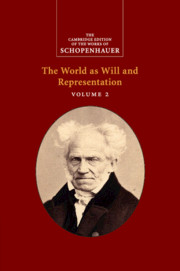Chapter 7 - On the Relation of Intuitive to Abstract Cognition
Published online by Cambridge University Press: 30 June 2022
Summary
Now since, as we have shown, concepts borrow their content from intuitive cognition, and the entire edifice of our world of thought therefore rests on the world of intuitions; we must accordingly be able to trace each concept, even if there are intermediary stages, back to the intuitions from which either it is itself immediately derived, or from which the concepts whose abstraction it is have been derived: i.e. we must be able to verify it with intuitions that act as examples in relation to the abstractions. These intuitions therefore provide the real content of all our thinking, and wherever they are lacking we do not have concepts but instead only words in our head. In this respect, our intellect is like a bank of issue which, when solvent, must have enough money ready in the registers to be able to redeem on demand all the notes that have been issued: intuitions are the ready cash, concepts are the receipts. – In this sense, intuitions could quite fittingly be called primary representations, and concepts by contrast secondary representations: not quite so aptly, the scholastics, at the insistence of Aristotle (Metaphysics VI, 11; XI, 1), called real things primary substances and concepts secondary substances. – Books communicate only secondary representations. Mere concepts of a thing, in the absence of intuition, give a merely general acquaintance with it. We get a completely thorough understanding of things and their relations only to the extent that we are able to picture them entirely in clear intuitions, without the help of words. To explain words using words, to compare concepts to other concepts, which is what most philosophizing consists of, is basically a game of back-and-forth across the conceptual spheres, in order to see which ones go into the others and which ones do not. At best this lets you draw some conclusions, but conclusions do not give completely new cognition, they only show us everything that is already present and what aspects of it might be applied in any given case. Intuiting, on the other hand, letting the things themselves speak to us, grasping new relations between them and then putting or recording all this into concepts so as to possess it more securely: this provides new cognitions.
- Type
- Chapter
- Information
- Schopenhauer: The World as Will and Representation , pp. 77 - 97Publisher: Cambridge University PressPrint publication year: 2018

